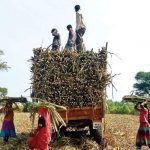Bajaj Hindusthan Sugar has urged the Government to consider a price revision for ethanol produced from Sugarcane Syrup and B-heavy molasses, which will cover the production costs more accurately.
In its 92nd Annual report for the financial year, 2023-24, the company said that there is a need to rationalise ethanol price from Sugarcane Syrup as the current ethanol price of Rs. 65.61 per litre is not viable and there are various proposals from the industry association to align it in line with the cost.
Similarly, the current price of ethanol from B-heavy molasses ethanol is not viable and no increase has been allowed in its price this year. The company said that it is an urgent need of the industry to align the price of ethanol derived from B Heavy and Sugarcane Syrup in line with the production costs incurred by the industry.
On sugar MSP, the company said that an increase in the MSP for sugar is crucial to account for rising input costs, particularly cane prices, which have witnessed a significant increase in recent years. It is high time that the Government should increase MSP in line with increasing cost in terms of cane price/other inputs to the level of minimum Rs 40 per Kg which is also being pursued by various Industry bodies.
In the Annual Report, Kushagra Nayan Bajaj, Chairman, Bajaj Hindusthan Sugar Limited said that the year has been a transformative year for the company due to evolving market dynamics, renewed focus on operational excellence, sustainability, and social responsibility.
He said that the global sugar industry witnessed a volatile period. “Strong sugar prices globally, driven by factors such as reduced exports from India significantly reshaped the market dynamics, presenting both challenges and opportunities for your company”, he said.
Bajaj said that the Government decided to restrict sugar exports in 2023-24 to ensure domestic availability, however, it unquestionably impacted the export volumes and deprived domestic sugar mills from realising higher international prices.
He said that the limitations on diverting sugar towards ethanol production added another layer of complexity, however, the company was quick to act and proactively shifted its cane crushing operations to C Molasses instead of B Molasses or syrup well ahead of these restrictions.
There have been significant developments in the current year for the company. “Perhaps the most significant of these was the successful resolution of the NCLT issue concerning your company. This dismissal of the insolvency petition, following the settlement of dues, allows us to focus on our core business activities. This positive development has instilled renewed confidence within the organisation, enabling us to invest in the future with greater vigour and clarity,” the Chairman said.
The company has called for the initiation of measures to implement better water conservation mechanisms. Techniques such as drip irrigation, rainwater harvesting, trash shredding, and mulching are essential to mitigate weather-related fluctuations in cane crop production.
“The industry must address weather-related volatility in cane crop production by adopting best farming practices and effective water conservation methods. Achieving consistent crop yields is crucial as the country aims for 20% ethanol blending by 2025, with almost 50% of this quantity expected to come through the sugar route, ” Bajaj concluded.












